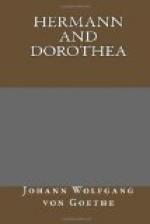Thereupon spoke the good mother, and thus with intelligence
answered:
“Son, not greater thy wish to bring thee a bride
to thy chamber,
That thou mayst find thy nights a beautiful part of
existence,
And that the work of the day may gain independence
and freedom,
Than is thy father’s wish too, and thy mother’s.
We always have counselled,—
Yea, we have even insisted,—that thou shouldst
select thee a maiden.
But I was ever aware, and now my heart gives me assurance,
That till the hour appointed is come, and the maiden
appointed
Shall with the hour appear, the choice will be left
for the future,
While more strong than all else will be fear of grasping
the wrong one.
If I may say it, my son, I believe thou already hast
chosen;
For thy heart has been touched, and been made more
than wontedly tender.
Speak it out honestly, then; for my soul has told
me beforehand:
That same maiden it is, the exile, whom thou hast
elected.”
“Thou has said, mother!” the son thereupon
with eagerness answered.
“Yes, it is she; and if I to-day as my bride
do not bring her
Home to our dwelling, she from me will go, perhaps
vanish for ever,
Lost in the war’s confusion and sad movings
hither and thither.
Mother, for ever in vain would then our abundant possessions
Prosper before me, and seasons to come be in vain
to me fruitful.
Yea, I should hold in aversion the wonted house and
the garden:
Even my mother’s love, alas! would not comfort
my sorrow.
Every tie, so I feel in my heart, by love is unloosened
Soon as she fastens her own; and not the maid is it
only
Leaves behind father and mother, to follow the man
she has chosen.
He too, the youth, no longer knows aught of mother
and father,
When he the maiden, his only beloved, sees vanishing
from him.
Suffer me, then, to go hence wherever despair shall
impel me:
Since by my father himself the decisive words have
been spoken;
Since his house can no longer be mine if he shut out
the maiden,
Her whom alone as my bride I desire to bring to our
dwelling.”
Thereupon quickly made answer the good and intelligent
mother:
“How like to rocks, forsooth, two men will stand
facing each other!
Proud and not to be moved, will neither draw near
to his fellow;
Neither will stir his tongue to utter the first word
of kindness.
Therefore I tell thee, my son, a hope yet lives in
my bosom,
So she be honest and good, thy father will let thee
espouse her,
Even though poor, and against a poor girl so decisive
his sentence.
Many a thing he is wont to speak out in his violent
fashion
Which he yet never performs; and so what he denies
will consent to.
Yet he requires a kindly word, and is right to require
it: He is the father!
Besides we know that his wrath after dinner,—
When he most hastily speaks, and questions all others’
opinions,—
Signifies naught; the full force of his violent will




